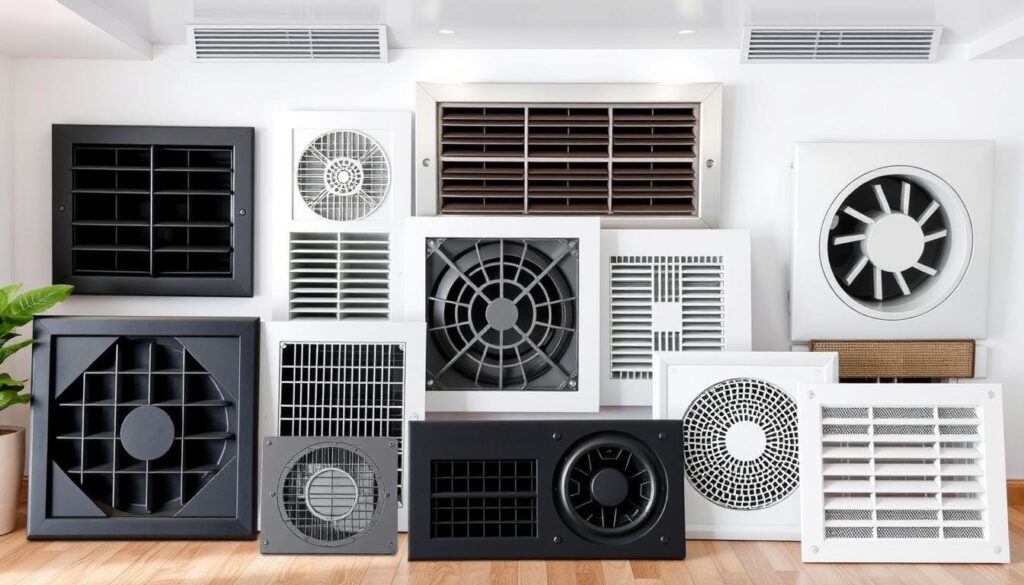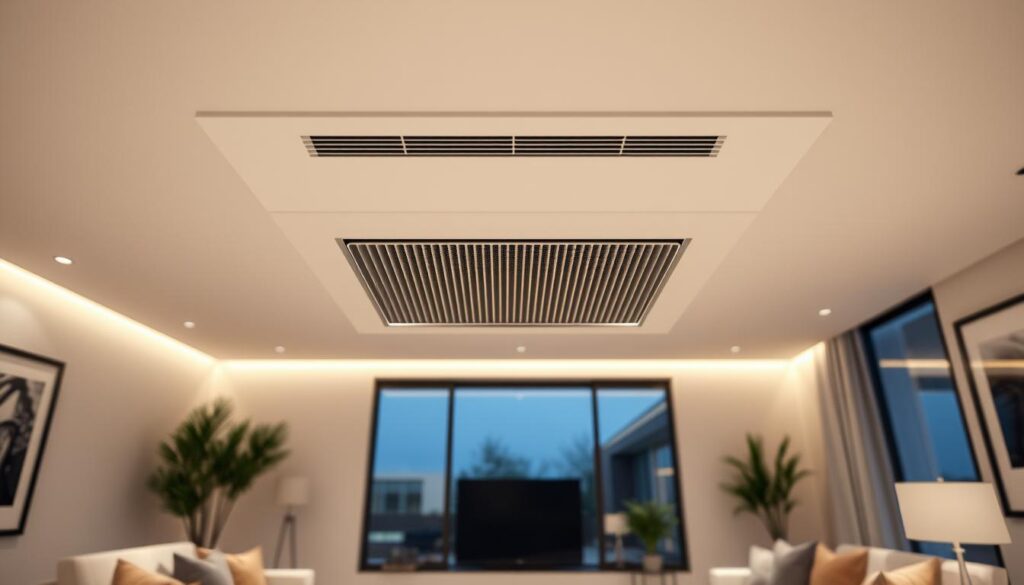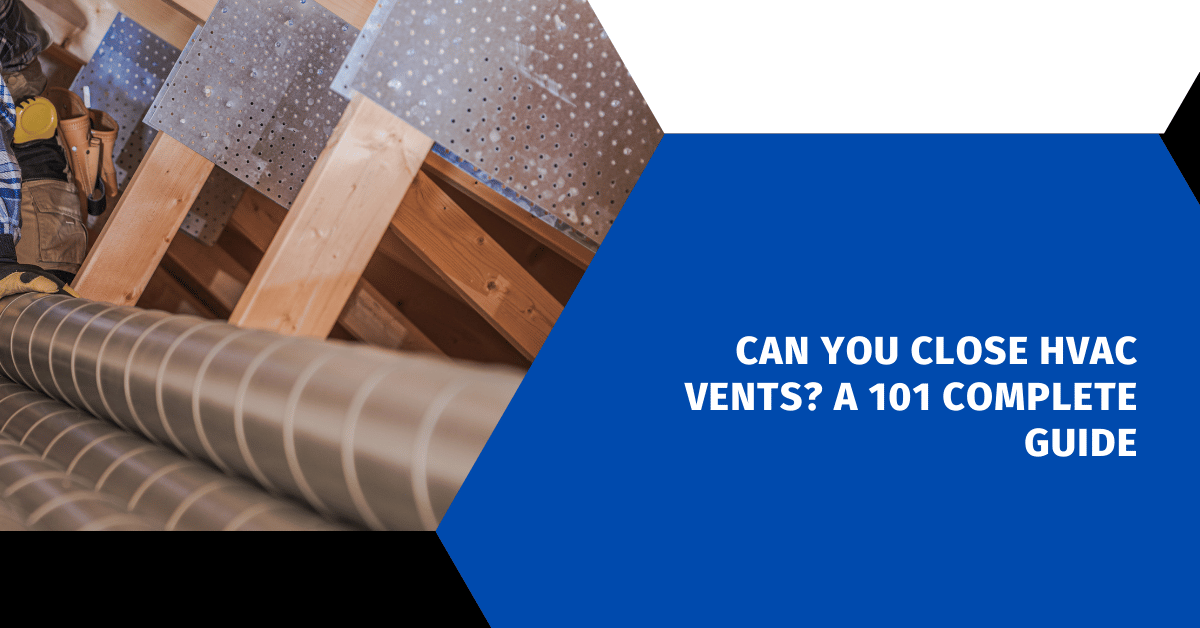Affiliate Disclosure
HVAC Guide Guys is a participant in the Amazon Services LLC Associates Program, an affiliate advertising program designed to provide a means for sites to earn advertising fees by advertising and linking to Amazon.
Can You Close HVAC Vents? “The true measure of a man is not how he behaves in moments of comfort and convenience, but how he stands at times of challenge and controversy.” – Martin Luther King Jr.
Many homeowners wonder if they can close HVAC vents to save energy. Closing vents might seem like an easy way to cut costs. But, it can actually harm your home’s comfort, energy use, and even your HVAC system’s life.
This guide will explore HVAC vent systems and the effects of closing vents. You’ll learn how to improve your home’s airflow and energy use. Knowing your HVAC system well helps you make smart choices for comfort and savings.

Key Takeaways
- Closing HVAC vents can have unintended consequences, including pressure buildup, system strain, and potential damage.
- Proper airflow management is crucial for maintaining energy efficiency and home comfort.
- Alternatives such as zoning systems and smart thermostats offer more effective solutions for managing your home’s temperature and airflow.
- Consultation with HVAC professionals can provide guidance on the optimal number of vents to close without compromising system performance.
- Understanding the basics of your HVAC system is key to making informed decisions about vent management.
Table of Contents
Understanding Your HVAC Vent System Basics
To keep your home comfy and energy-smart, knowing your HVAC vent system is key. HVAC systems ensure air flows well in your home. This keeps the temperature steady and air quality good.
How Air Circulation Works in Your Home
HVAC systems balance air movement carefully. Supply vents send out the cooled or heated air. Return vents pull air back to be adjusted again. This balance keeps your home’s temperature and air flow right.
Components of HVAC Vents and Registers
Your HVAC system has important parts like supply vents, return vents, and registers. Supply vents send out the air, while return vents pull it back. Registers are the grilles that let you control air flow in each room.
The Role of Proper Airflow
Good airflow is vital for your HVAC system’s efficiency. Problems like blocked vents can cause duct pressure to rise. This can make your system work less well and use more energy. So, keeping air flow free is key to your system’s performance.
| HVAC Component | Function |
|---|---|
| Supply Vents | Distribute conditioned air into the room |
| Return Vents | Draw air back into the HVAC system for heating or cooling |
| Registers | Grilles that cover vents and allow airflow control |
Knowing your HVAC system basics helps you manage your home’s air better. This keeps your system running well.
Explore Our HVAC Shop
Looking for top-rated HVAC tools, parts, and accessories? Visit our shop and find the perfect solution for your needs.
Visit the ShopCan You Close HVAC Vents: The Truth Revealed
Experts say it’s not a good idea to close all HVAC vents. It might seem smart to block vents in unused rooms. But, it can actually hurt your heating and cooling system.
HVAC systems are made to warm and cool your whole home. Changing this balance can cause problems. Closing vents can make the system work too hard, leading to overheating and breakdowns.
Studies show closing vents can increase system pressure by up to 20%. This puts a lot of strain on the system, making it less efficient. It can also make your energy bills go up.
Moreover, closing vents can let conditioned air escape through duct leaks. This can waste up to 30% of the air the system pushes out.
| Issue | Impact |
|---|---|
| Pressure build-up | Up to 20% increase in HVAC system pressure |
| Efficiency reduction | Up to 15% decrease in HVAC efficiency |
| Duct leakage | Up to 30% loss of conditioned air |
Instead of closing vents, try these safe alternatives to boost your home’s HVAC efficiency and airflow management:
- Change air filters every 90 days to keep the system running well
- Use air purifiers to ease the system’s workload and improve air quality
- Seal gaps and improve insulation to make the system more efficient and last longer
- Look into zoned heating and cooling systems for better temperature control in each room
Knowing the risks of closing HVAC vents helps you make better choices. You can keep your home’s heating and cooling system healthy. And, you can also keep your energy costs down.
Explore Our HVAC Shop
Looking for top-rated HVAC tools, parts, and accessories? Visit our shop and find the perfect solution for your needs.
Visit the ShopThe Impact of Closed Vents on System Performance
Closing air vents might seem like a simple way to save energy. But it can actually harm your HVAC system’s performance. It disrupts the airflow balance your system is designed for. This can lead to issues that affect both efficiency and the life of your heating and cooling equipment.
Pressure Build-up and System Strain
One major concern with closed vents is the pressure build-up in your HVAC system. Restricted airflow makes the blower motor work harder. This increases static pressure and strains critical components like the blower motor and compressor. It can cause them to fail early, leading to expensive repairs.
Energy Efficiency Consequences
Closing vents does not save energy. In fact, it can increase energy use. The HVAC system works harder to circulate air, leading to higher energy consumption and bills. The system uses the same amount of energy whether vents are open or closed, working overtime due to restricted airflow.
Risk of System Damage
Closing vents also raises the risk of long-term damage to your HVAC system. Increased pressure can cause duct leaks and cracks in the heat exchanger. This can lead to dangerous issues like carbon monoxide infiltration. Insufficient airflow can also cause the system to freeze up, damaging components and potentially leading to system failure.
Common Reasons People Close Their Vents
Many homeowners close HVAC vents to save energy or control the temperature. This might seem like a smart move, but it can cause problems. It can hurt the efficiency and performance of the whole HVAC system.
One reason is to save energy in unused rooms like guest bedrooms or home offices. People think closing vents in these areas will cut down energy use. But, the article says this doesn’t really help keep the whole house at a comfortable temperature.
Another reason is to balance temperatures between different parts of the house. For example, closing upper floor vents to warm up the lower floors. But, this can lead to uneven temperatures and make the HVAC system work too hard. This can raise energy bills.
Some folks try to zone their home by closing vents. They think this will send more air to the rooms they use most. But, the article warns that this can be based on wrong ideas about HVAC systems. It can damage the system and make it less efficient.
| Reason for Closing Vents | Potential Consequences |
|---|---|
| Saving energy in unused rooms | Doesn’t reduce air volume needed, leads to inefficient HVAC operation |
| Balancing temperatures between floors | Creates temperature imbalances, increases energy bills |
| Attempting makeshift zoning | Stems from misconceptions, can damage HVAC system |

It’s clear that people want to control the temperature and save energy. But, closing HVAC vents isn’t the best way to do it. Instead, homeowners should look into professional zoning solutions or other ways to make their HVAC system work better. This will help keep the house comfortable without wasting energy or harming air quality.
Explore Our HVAC Shop
Looking for top-rated HVAC tools, parts, and accessories? Visit our shop and find the perfect solution for your needs.
Visit the ShopPotential Risks and Consequences of Closing Vents
Closing HVAC vents might seem like a simple way to control your home’s temperature. But, it can lead to many problems that cost more in the long run. These include higher energy costs, system damage and repairs, and air quality issues. It’s key to know these risks before you close any vents.
Increased Energy Costs
Closing air supply vents raises the air pressure in your ducts. This can cause leaks and lost heat to escape into unheated areas. Your furnace then has to work longer, which means higher energy use and bills.
Closed vents also mess with your HVAC system’s temperature balance. This makes it work harder to keep the temperature right. This can also increase your energy bills.
System Damage and Repairs
When vents are closed, the ductwork’s increased static pressure can harm your HVAC system. This might cause parts to fail and need expensive repairs. Closed vents can also shorten the life of the blower motor, freeze the evaporator coil, and overheat the furnace.
These issues can lead to costly maintenance and replacement of your system.
Air Quality Issues
Closed vents can make the air in your home stale, humid, and full of allergens and pollutants. This can hurt your indoor air quality. Poor air flow can also let mold grow, which is dangerous for your health and might need HVAC servicing to fix.
While closing vents might help in some cases, it’s best to avoid it. Keeping air flowing well is key for your HVAC system’s health and safety. It also helps keep your home comfortable and healthy.
Safe Alternatives to Closing Vents
Instead of shutting your HVAC vents, look into better ways to manage air and temperature at home. Options like partial vent closure, zoning systems, and new HVAC tech can offer comfort without the dangers of vent closure.
Try closing vents only partially, up to 75%. This can help air flow better without putting too much pressure on your HVAC system.
For rooms that are hard to heat or cool, consider a ductless HVAC alternative like a Mitsubishi Electric system. These mini-split systems let you control temperature in specific zones, saving energy and boosting comfort.
Also, think about upgrading to advanced HVAC systems. Look into multi-stage systems, modulating gas valves, or variable-speed outdoor units. These offer better airflow management and energy use, beating traditional single-stage systems.
“Closing air vents in rooms you don’t use often can lead to negative effects, like increased energy costs and strain on the HVAC system,” warns South End Plumbing, Heating, & Air.
Exploring these alternatives can keep your home comfortable, save energy, and make your HVAC last longer. All without the risks of closing vents.
| HVAC Alternative | Benefits |
|---|---|
| Partial Vent Closure | Improved air circulation without significant pressure buildup or strain on the HVAC system |
| Ductless Mini-Split Systems | Targeted, zone-based temperature control for hard-to-heat or cool rooms, enhanced energy efficiency |
| Advanced HVAC Equipment | Superior airflow management and temperature control, reduced energy consumption |
Understanding Zoning Systems as a Better Solution
Managing different temperature needs in your home is easier with HVAC zoning systems. They are better than just closing HVAC vents. These systems use dampers and separate thermostats to control airflow and temperature in different zones. This ensures comfort and saves energy.
Benefits of Professional Zoning
HVAC zoning systems can save a lot of energy. Studies show they can cut heating and cooling costs by up to 30%. They also improve air quality by stopping allergens and pollutants from spreading.
These systems are great for homes with many levels or uneven heating. They let you control the temperature in each area. This means everyone in your home can be comfortable.
Smart Thermostat Integration
Adding smart thermostats to HVAC zoning systems makes temperature control even better. Automated dampers controlled by smart thermostats let you adjust temperatures easily. You can do it from anywhere or with voice commands.
This mix of zoning and smart tech boosts your comfort and saves energy. It optimizes heating and cooling based on how you use your home.
Want to control your home’s temperature and energy use? Look into professional HVAC zoning systems and smart thermostat integration. These advanced solutions make your home more comfortable and energy-efficient.
Explore Our HVAC Shop
Looking for top-rated HVAC tools, parts, and accessories? Visit our shop and find the perfect solution for your needs.
Visit the ShopProper Vent Management Tips and Best Practices
Effective vent management is key for your HVAC system’s health and energy use. Closing vents might seem easy, but it can actually hurt more than help. To keep your home comfy and your energy bills low, follow these tips and best practices:
- Avoid closing vents completely. If you need to adjust airflow, close vents no more than 75% to avoid system strain and pressure buildup.
- Regularly check and clean your vents for free airflow. Dust and debris can block your HVAC system’s effectiveness.
- Get professional HVAC checks to find and fix airflow problems in your home. A skilled technician can help with uneven temperatures.
- Use smart thermostats and zoning systems for better temperature and airflow control. These tools help save energy by controlling specific areas of your home.
- Know your HVAC system’s design and get advice from HVAC experts. Every home is different, so a one-size-fits-all approach might not work.
By following these tips, you can keep your vent management in top shape, ensure your HVAC maintenance is on point, and boost your home’s energy efficiency. Remember, your HVAC system is vital for your comfort and energy costs. Proper care and management can make a big difference.
| Vent Management Best Practices | Benefits |
|---|---|
| Avoid closing vents completely | Prevents system strain and pressure buildup |
| Regular vent cleaning and maintenance | Ensures unrestricted airflow and HVAC efficiency |
| Professional HVAC evaluations | Identifies and resolves underlying airflow issues |
| Utilize smart thermostats and zoning systems | Enables efficient temperature control and energy savings |
| Consult HVAC professionals for personalized advice | Ensures the best vent management solution for your home |

“Proper vent management is essential for maintaining the health and efficiency of your HVAC system, and ultimately, the comfort and energy savings of your home.”
Conclusion
It might seem easy to close HVAC vents to save energy and control temperatures. But, it often causes more issues than it solves. Knowing how important airflow is for your HVAC system is key to keeping it working well and your home comfortable.
Closing vents can mess up your system’s balance, leading to pressure problems, wasted energy, and damage. Instead, look into professional zoning options or get help from HVAC experts. They can help your system work better without harming it.
Managing vents right, using smart thermostats, and keeping up with maintenance are the secrets to HVAC efficiency, home comfort, and saving energy in the long run. By learning about your HVAC system and making smart choices, you can keep your home cozy and your energy bills low.

